Fleurs du Mal Magazine


Or see the index
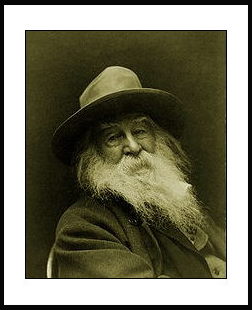
Walt Whitman
(1819 – 1892)
Satan
Aloof, dissatisfied, plotting revolt,
Comrade of criminals, brother of slaves,
Crafty, despised, a drudge, ignorant,
With sudra face and worn brow–black, but in the depths of my heart proud
as any;
Lifted, now and always, against whoever, scorning, assumes to rule me;
Morose, full of guile, full of reminiscences, brooding, with many wiles,
Though it was thought I was baffled and dispelled, and my wiles done–but
that will never be;
Defiant I SATAN still live–still utter words–in new lands duly appearing,
and old ones also;
Permanent here, from my side, warlike, equal with any, real as any,
Nor time, nor change, shall ever change me or my words.
Walt Whitman poetry
fleursdumal.nl magazine
More in: Archive W-X, Whitman, Walt

Walt Whitman
(1819 – 1892)
Pulse of my life
Not heaving from my ribbed breast only;
Not in sighs at night, in rage, dissatisfied with myself;
Not in those long-drawn, ill-suppressed sighs;
Not in many an oath and promise broken;
Not in my wilful and savage soul’s volition;
Not in the subtle nourishment of the air;
Not in this beating and pounding at my temples and wrists;
Not in the curious systole and diastole within, which will one day cease;
Not in many a hungry wish, told to the skies only;
Not in cries, laughter, defiances, thrown from me when alone, far in the
wilds;
Not in husky pantings through clenched teeth;
Not in sounded and resounded words–chattering words, echoes, dead words;
Not in the murmurs of my dreams while I sleep,
Nor the other murmurs of these incredible dreams of every day;
Nor in the limbs and senses of my body, that take you and dismiss you
continually–Not there;
Not in any or all of them, O Adhesiveness! O pulse of my life!
Need I that you exist and show yourself, any more than in these songs.
Walt Whitman poetry
fleursdumal.nl magazine
More in: Archive W-X, Whitman, Walt
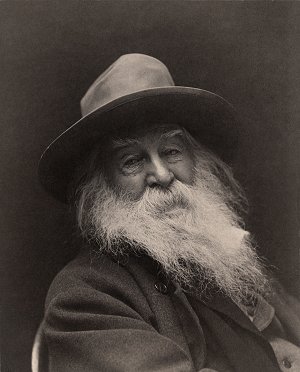
Walt Whitman
(1819–1892)
A Song
Come, I will make the continent indissoluble;
I will make the most splendid race the sun ever yet shone upon;
I will make divine magnetic lands,
With the love of comrades,
With the life-long love of comrades.
I will plant companionship thick as trees along all the rivers of
America, and along the shores of the great lakes, and all over
the prairies;
I will make inseparable cities, with their arms about each other’s
necks;
By the love of comrades,
By the manly love of comrades.
For you these, from me, O Democracy, to serve you, ma femme! 10
For you! for you, I am trilling these songs,
In the love of comrades,
In the high-towering love of comrades.
Walt Whitman poetry
fleursdumal.nl magazine
More in: Archive W-X, Whitman, Walt
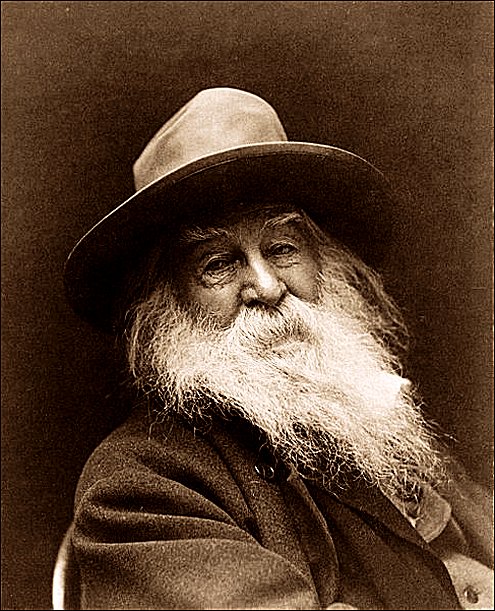
Walt Whitman
(1819–1892)
A Song
Come, I will make the continent indissoluble;
I will make the most splendid race the sun ever yet shone upon;
I will make divine magnetic lands,
With the love of comrades,
With the life-long love of comrades.
I will plant companionship thick as trees along all the rivers of
America, and along the shores of the great lakes, and all over
the prairies;
I will make inseparable cities, with their arms about each other’s
necks;
By the love of comrades,
By the manly love of comrades.
For you these, from me, O Democracy, to serve you, ma femme! 10
For you! for you, I am trilling these songs,
In the love of comrades,
In the high-towering love of comrades.
Walt Whitman poetry
kempis.nl poetry magazine
More in: Archive W-X, Whitman, Walt


Wandering At Morn
Wandering at morn,
Emerging from the night, from gloomy thoughts–thee in my thoughts,
Yearning for thee, harmonious Union! thee, Singing Bird divine!
Thee, seated coil’d in evil times, my Country, with craft and black
dismay–with every meanness, treason thrust upon thee;
–Wandering–this common marvel I beheld–the parent thrush I
watch’d, feeding its young,
(The singing thrush, whose tones of joy and faith ecstatic,
Fail not to certify and cheer my soul.)
There ponder’d, felt I,
If worms, snakes, loathsome grubs, may to sweet spiritual songs be
turn’d,
If vermin so transposed, so used, so bless’d may be, 10
Then may I trust in you, your fortunes, days, my country;
–Who knows that these may be the lessons fit for you?
From these your future Song may rise, with joyous trills,
Destin’d to fill the world.
Walt Whitman
(1819-1892)


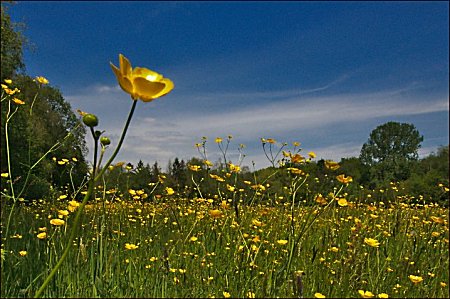
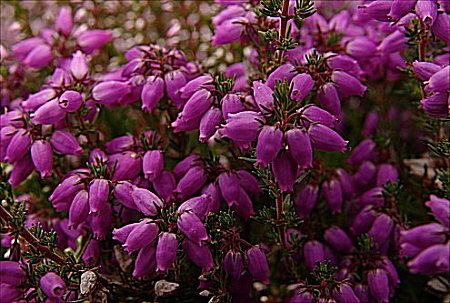
Hans Hermans photos – Natuurdagboek 04-12
Gedicht Walt Whitman
kempis.nl poetry magazine
More in: Hans Hermans Photos, Whitman, Walt
.jpg)
W a l t W h i t m a n
(1819-1892)
T o w o r k i n g m e n
1
Come closer to me;
Push close, my lovers, and take the best I possess;
Yield closer and closer, and give me the best you possess.
This is unfinished business with me–How is it with you?
(I was chilled with the cold types, cylinder, wet paper between us.)
Male and Female!
I pass so poorly with paper and types, I must pass with the contact of
bodies and souls.
American masses!
I do not thank you for liking me as I am, and liking the touch of me–I
know that it is good for you to do so.
2
This is the poem of occupations;
In the labour of engines and trades, and the labour of fields, I find the
developments,
And find the eternal meanings.
Workmen and Workwomen!
Were all educations, practical and ornamental, well displayed out of me,
what would it amount to?
Were I as the head teacher, charitable proprietor, wise statesman, what
would it amount to?
Were I to you as the boss employing and paying you, would that satisfy you?
The learned, virtuous, benevolent, and the usual terms;
A man like me, and never the usual terms.
Neither a servant nor a master am I;
I take no sooner a large price than a small price–I will have my own,
whoever enjoys me;
I will be even with you, and you shall be even with me.
If you stand at work in a shop, I stand as nigh as the nighest in the same
shop;
If you bestow gifts on your brother or dearest friend, I demand as good as
your brother or dearest friend;
If your lover, husband, wife, is welcome by day or night, I must be
personally as welcome;
If you become degraded, criminal, ill, then I become so for your sake;
If you remember your foolish and outlawed deeds, do you think I cannot
remember my own foolish and outlawed deeds?
If you carouse at the table, I carouse at the opposite side of the table;
If you meet some stranger in the streets, and love him or her–why I often
meet strangers in the street, and love them.
Why, what have you thought of yourself?
Is it you then that thought yourself less?
Is it you that thought the President greater than you?
Or the rich better off than you? or the educated wiser than you?
Because you are greasy or pimpled, or that you was once drunk, or a thief,
Or diseased, or rheumatic, or a prostitute, or are so now;
Or from frivolity or impotence, or that you are no scholar, and never saw
your name in print,
Do you give in that you are any less immortal?
3
Souls of men and women! it is not you I call unseen, unheard, untouchable
and untouching;
It is not you I go argue pro and con about, and to settle whether you are
alive or no;
I own publicly who you are, if nobody else owns.
Grown, half-grown, and babe, of this country and every country, indoors and
outdoors, one just as much as the other, I see,
And all else behind or through them.
The wife–and she is not one jot less than the husband;
The daughter–and she is just as good as the son;
The mother–and she is every bit as much as the father.
Offspring of ignorant and poor, boys apprenticed to trades,
Young fellows working on farms, and old fellows working on farms,
Sailor-men, merchant-men, coasters, immigrants,
All these I see–but nigher and farther the same I see;
None shall escape me, and none shall wish to escape me.
I bring what you much need, yet always have,
Not money, amours, dress, eating, but as good;
I send no agent or medium, offer no representative of value, but offer the
value itself.
There is something that comes home to one now and perpetually;
It is not what is printed, preached, discussed–it eludes discussion and
print;
It is not to be put in a book–it is not in this book;
It is for you, whoever you are–it is no farther from you than your hearing
and sight are from you;
It is hinted by nearest, commonest, readiest–it is ever provoked by them.
You may read in many languages, yet read nothing about it;
You may read the President’s Message, and read nothing about it there;
Nothing in the reports from the State department or Treasury department, or
in the daily papers or the weekly papers,
Or in the census or revenue returns, prices current, or any accounts of
stock.
4
The sun and stars that float in the open air;
The apple-shaped earth, and we upon it–surely the drift of them is
something grand!
I do not know what it is, except that it is grand, and that it is
happiness,
And that the enclosing purport of us here is not a speculation, or bon-mot,
or reconnoissance,
And that it is not something which by luck may turn out well for us, and
without luck must be a failure for us,
And not something which may yet be retracted in a certain contingency.
The light and shade, the curious sense of body and identity, the greed that
with perfect complaisance devours all things, the endless pride and
outstretching of man, unspeakable joys and sorrows,
The wonder every one sees in every one else he sees, and the wonders that
fill each minute of time for ever,
What have you reckoned them for, camerado?
Have you reckoned them for a trade, or farm-work? or for the profits of a
store?
Or to achieve yourself a position? or to fill a gentleman’s leisure, or a
lady’s leisure?
Have you reckoned the landscape took substance and form that it might be
painted in a picture?
Or men and women that they might be written of, and songs sung?
Or the attraction of gravity, and the great laws and harmonious
combinations, and the fluids of the air, as subjects for the
savans?
Or the brown land and the blue sea for maps and charts?
Or the stars to be put in constellations and named fancy names?
Or that the growth of seeds is for agricultural tables, or agriculture
itself?
Old institutions–these arts, libraries, legends, collections, and the
practice handed along in manufactures–will we rate them so high?
Will we rate our cash and business high?–I have no objection;
I rate them as high as the highest–then a child born of a woman and man I
rate beyond all rate.
We thought our Union grand, and our Constitution grand;
I do not say they are not grand and good, for they are;
I am this day just as much in love with them as you;
Then I am in love with you, and with all my fellows upon the earth.
We consider Bibles and religions divine–I do not say they are not divine;
I say they have all grown out of you, and may grow out of you still;
It is not they who give the life–it is you who give the life;
Leaves are not more shed from the trees, or trees from the earth, than they
are shed out of you.
5
When the psalm sings, instead of the singer;
When the script preaches, instead of the preacher;
When the pulpit descends and goes, instead of the carver that carved the
supporting desk;
When I can touch the body of books, by night or by day, and when they touch
my body back again;
When a university course convinces, like a slumbering woman and child
convince;
When the minted gold in the vault smiles like the night-watchman’s
daughter;
When warrantee deeds loafe in chairs opposite, and are my friendly
companions;
I intend to reach them my hand, and make as much of them as I do of men and
women like you.
The sum of all known reverence I add up in you, whoever you are;
The President is there in the White House for you–it is not you who are
here for him;
The Secretaries act in their bureaus for you–not you here for them;
The Congress convenes every twelfth month for you;
Laws, courts, the forming of States, the charters of cities, the going and
coming of commerce and mails, are all for you.
List close, my scholars dear!
All doctrines, all politics and civilisation, exsurge from you;
All sculpture and monuments, and anything inscribed anywhere, are tallied
in you;
The gist of histories and statistics, as far back as the records reach, is
in you this hour, and myths and tales the same;
If you were not breathing and walking here, where would they all be?
The most renowned poems would be ashes, orations and plays would be
vacuums.
All architecture is what you do to it when you look upon it;
Did you think it was in the white or grey stone? or the lines of the arches
and cornices?
All music is what awakes from you, when you are reminded by the
instruments;
It is not the violins and the cornets–it is not the oboe nor the beating
drums, nor the score of the baritone singer singing his sweet
romanza–nor that of the men’s chorus, nor that of the women’s
chorus,
It is nearer and farther than they.
6
Will the whole come back then?
Can each see signs of the best by a look in the looking-glass? is there
nothing greater or more?
Does all sit there with you, with the mystic, unseen soul?
Strange and hard that paradox true I give;
Objects gross and the unseen Soul are one.
House-building, measuring, sawing the boards;
Blacksmithing, glass-blowing, nail-making, coopering, tin-roofing, shingle-
dressing,
Ship-joining, dock-building, fish-curing, ferrying, flagging of side-walks
by flaggers,
The pump, the pile-driver, the great derrick, the coal-kiln and brick-kiln,
Coal-mines, and all that is down there,–the lamps in the darkness, echoes,
songs, what meditations, what vast native thoughts looking through
smutched faces,
Ironworks, forge-fires in the mountains, or by the river-banks–men around
feeling the melt with huge crowbars–lumps of ore, the due
combining of ore, limestone, coal–the blast-furnace and the
puddling-furnace, the loup-lump at the bottom of the melt at last–
the rolling-mill, the stumpy bars of pig-iron, the strong, clean
shaped T-rail for railroads;
Oilworks, silkworks, white-lead-works, the sugar-house, steam-saws, the
great mills and factories;
Stone-cutting, shapely trimmings for facades, or window or door lintels–
the mallet, the tooth-chisel, the jib to protect the thumb, Oakum,
the oakum-chisel, the caulking-iron–the kettle of boiling vault-
cement, and the fire under the kettle,
The cotton-bale, the stevedore’s hook, the saw and buck of the sawyer, the
mould of the moulder, the working knife of the butcher, the ice-
saw, and all the work with ice,
The implements for daguerreotyping–the tools of the rigger, grappler,
sail-maker, block-maker,
Goods of gutta-percha, papier-mache, colours, brushes, brush-making,
glaziers’ implements,
The veneer and glue-pot, the confectioner’s ornaments, the decanter and
glasses, the shears and flat-iron,
The awl and knee-strap, the pint measure and quart measure, the counter and
stool, the writing-pen of quill or metal–the making of all sorts
of edged tools,
The brewery, brewing, the malt, the vats, everything that is done by
brewers, also by wine-makers, also vinegar-makers,
Leather-dressing, coach-making, boiler-making, rope-twisting, distilling,
sign-painting, lime-burning, cotton-picking–electro-plating,
electrotyping, stereotyping,
Stave-machines, planing-machines, reaping-machines,
ploughing-machines, thrashing-machines, steam waggons,
The cart of the carman, the omnibus, the ponderous dray;
Pyrotechny, letting off coloured fireworks at night, fancy figures and
jets,
Beef on the butcher’s stall, the slaughter-house of the butcher, the
butcher in his killing-clothes,
The pens of live pork, the killing-hammer, the hog-hook, the scalder’s tub,
gutting, the cutter’s cleaver, the packer’s maul, and the plenteous
winter-work of pork-packing,
Flour-works, grinding of wheat, rye, maize, rice–the barrels and the half
and quarter barrels, the loaded barges, the high piles on wharves
and levees,
The men, and the work of the men, on railroads, coasters, fish-boats,
canals;
The daily routine of your own or any man’s life–the shop, yard, store, or
factory;
These shows all near you by day and night-workmen! whoever you are, your
daily life!
In that and them the heft of the heaviest–in them far more than you
estimated, and far less also;
In them realities for you and me–in them poems for you and me;
In them, not yourself–you and your soul enclose all things, regardless of
estimation;
In them the development good–in them, all themes and hints.
I do not affirm what you see beyond is futile–I do not advise you to stop;
I do not say leadings you thought great are not great;
But I say that none lead to greater than those lead to.
7
Will you seek afar off? You surely come back at last,
In things best known to you finding the best, or as good as the best,
In folks nearest to you finding the sweetest, strongest, lovingest;
Happiness, knowledge, not in another place, but this place–not for another
hour, but this hour;
Man in the first you see or touch–always in friend, brother, nighest
neighbour–Woman in mother, sister, wife;
The popular tastes and employments taking precedence in poems or anywhere,
You workwomen and workmen of these States having your own divine and strong
life,
And all else giving place to men and women like you.
Walt Whitman poem: To Working Men
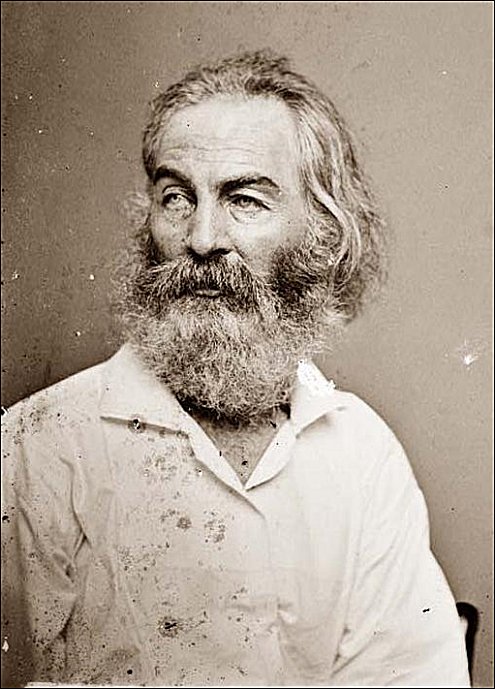
KEMP=MAG POETRY MAGAZINE
More in: Whitman, Walt
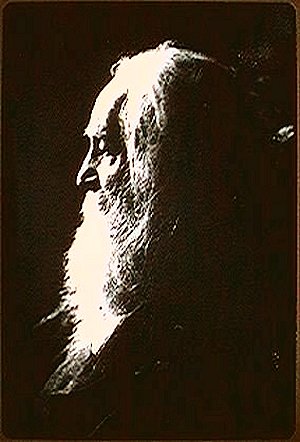
W a l t W h i t m a n
(1819-1892)
P u l s e o f m y l i f e
Not heaving from my ribbed breast only;
Not in sighs at night, in rage, dissatisfied with myself;
Not in those long-drawn, ill-suppressed sighs;
Not in many an oath and promise broken;
Not in my wilful and savage soul’s volition;
Not in the subtle nourishment of the air;
Not in this beating and pounding at my temples and wrists;
Not in the curious systole and diastole within, which will one day cease;
Not in many a hungry wish, told to the skies only;
Not in cries, laughter, defiances, thrown from me when alone, far in the
wilds;
Not in husky pantings through clenched teeth;
Not in sounded and resounded words–chattering words, echoes, dead words;
Not in the murmurs of my dreams while I sleep,
Nor the other murmurs of these incredible dreams of every day;
Nor in the limbs and senses of my body, that take you and dismiss you
continually–Not there;
Not in any or all of them, O Adhesiveness! O pulse of my life!
Need I that you exist and show yourself, any more than in these songs.
Poem of the week
April 19, 2009
.jpg)
KEMP=MAG poetry magazine
More in: Whitman, Walt
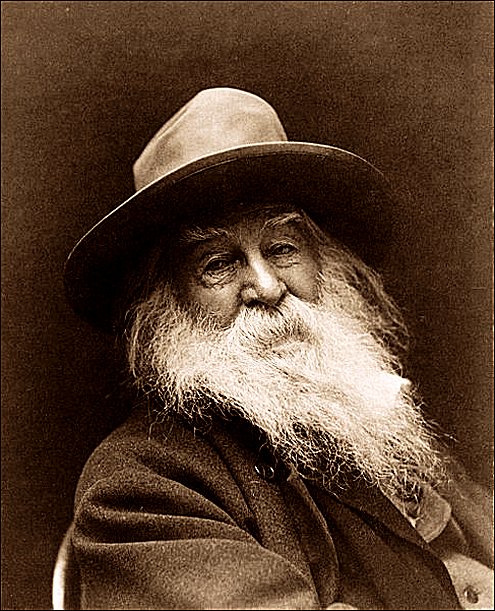
W a l t W h i t m a n
(1819-1892)
T h e P o e t
1
Now list to my morning’s romanza;
To the cities and farms I sing, as they spread in the sunshine before me.
2
A young man came to me bearing a message from his brother;
How should the young man know the whether and when of his brother?
Tell him to send me the signs.
And I stood before the young man face to face, and took his right hand in
my left hand, and his left hand in my right hand,
And I answered for his brother, and for men, and I answered for THE POET,
and sent these signs.
Him all wait for–him all yield up to–his word is decisive and final,
Him they accept, in him lave, in him perceive themselves, as amid light,
Him they immerse, and he immerses them.
Beautiful women, the haughtiest nations, laws, the landscape, people,
animals,
The profound earth and its attributes, and the unquiet ocean (so tell I my
morning’s romanza),
All enjoyments and properties, and money, and whatever money will buy,
The best farms–others toiling and planting, and he unavoidably reaps,
The noblest and costliest cities–others grading and building, and he
domiciles there,
Nothing for any one but what is for him–near and far are for him,–the
ships in the offing,
The perpetual shows and marches on land, are for him, if they are for
anybody.
He puts things in their attitudes;
He puts to-day out of himself, with plasticity and love;
He places his own city, times, reminiscences, parents, brothers and
sisters, associations, employment, politics, so that the rest never
shame them afterward, nor assume to command them.
He is the answerer;
What can be answered he answers–and what cannot be answered, he shows how
it cannot be answered.

3
A man is a summons and challenge;
(It is vain to skulk–Do you hear that mocking and laughter? Do you hear
the ironical echoes?)
Books, friendships, philosophers, priests, action, pleasure, pride, beat up
and down, seeking to give satisfaction;
He indicates the satisfaction, and indicates them that beat up and down
also.
Whichever the sex, whatever the season or place, he may go freshly and
gently and safely, by day or by night;
He has the pass-key of hearts–to him the response of the prying of hands
on the knobs.
His welcome is universal–the flow of beauty is not more welcome or
universal than he is;
The person he favours by day or sleeps with at night is blessed.
Every existence has its idiom–everything has an idiom and tongue;
He resolves all tongues into his own, and bestows it upon men, and any man
translates, and any man translates himself also;
One part does not counteract another part–he is the joiner–he sees how
they join.
He says indifferently and alike, "How are you, friend?" to the President
at his levee,
And he says, "Good-day, my brother!" to Cudge that hoes in the sugar-
field,
And both understand him, and know that his speech is right.
He walks with perfect ease in the Capitol,
He walks among the Congress, and one representative says to another, "Here
is our equal, appearing and new."
4
Then the mechanics take him for a mechanic,
And the soldiers suppose him to be a soldier, and the sailors that he has
followed the sea,
And the authors take him for an author, and the artists for an artist,
And the labourers perceive he could labour with them and love them;
No matter what the work is, that he is the one to follow it, or has
followed it,
No matter what the nation, that he might find his brothers and sisters
there.
The English believe he comes of their English stock,
A Jew to the Jew he seems–a Russ to the Russ–usual and near, removed from
none.
Whoever he looks at in the travellers’ coffee-house claims him;
The Italian or Frenchman is sure, and the German is sure, and the Spaniard
is sure, and the island Cuban is sure;
The engineer, the deck-hand on the great lakes, or on the Mississippi, or
St. Lawrence, or Sacramento, or Hudson, or Paumanok Sound, claims him.
The gentleman of perfect blood acknowledges his perfect blood;
The insulter, the prostitute, the angry person, the beggar, see themselves
in the ways of him–he strangely transmutes them,
They are not vile any more–they hardly know themselves, they are so grown.
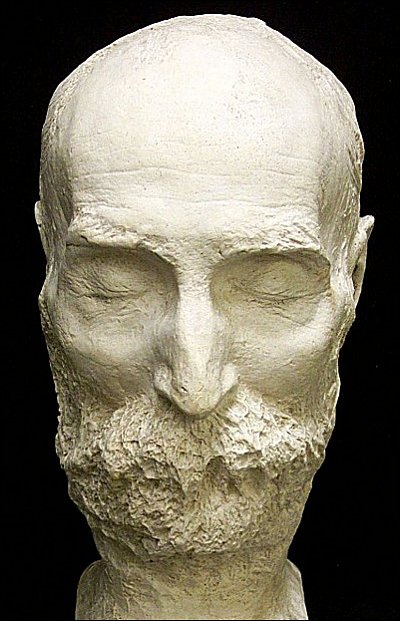
Walt Whitman poem: The Poet
KEMP=MAG poetry magazine
More in: Whitman, Walt
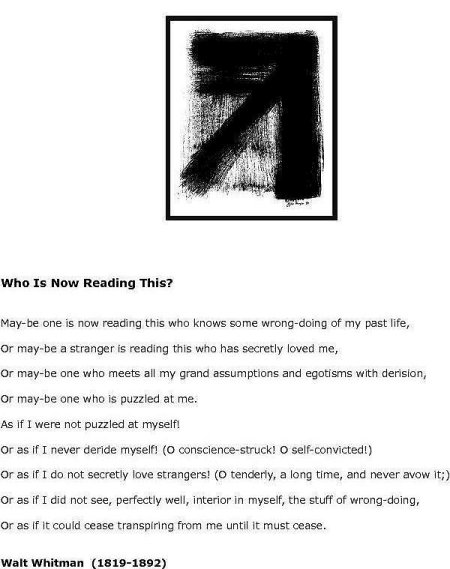

Poets to Come
Poets to come!
orators, singers, musicians to come!
Not to-day is to justify me and answer what I am for,
But you, a new brood, native, athletic,
continental, greater than before known,
Arouse! for you must justify me.
I myself but write one or two indicative words
for the future,
I but advance a moment only to wheel and hurry
back in the darkness.
I am a man who, sauntering along without fully stopping,
turns a casual look upon you and then averts his face,
Leaving it to you to prove and define it,
Expecting the main things from you.
To the Garden the World
To the garden the world anew ascending,
Potent mates, daughters, sons, preluding,
The love, the life of their bodies,
meaning and being,
Curious here behold my resurrection after slumber,
The revolving cycles in their wide sweep
having brought me again,
Amorous, mature, all beautiful to me, all wondrous,
My limbs and the quivering fire that ever plays
through them, for reasons, most wondrous,
Existing I peer and penetrate still,
Content with the present, content with the past,
By my side or back of me Eve following,
Or in front, and I following her just the same.
Tears
Tears! tears! tears!
In the night, in solitude, tears,
On the white shore dripping, dripping, suck’d in by the sand,
Tears, not a star shining, all dark and desolate,
Moist tears from the eyes of a muffled head;
O who is that ghost? that form in the dark, with tears?
What shapeless lump is that, bent, crouch’d there on the sand?
Streaming tears, sobbing tears, throes, choked with wild cries;
O storm, embodied, rising, careering with swift steps along the beach!
O wild and dismal night storm, with wind–O belching and desperate!
O shade so sedate and decorous by day, with calm countenance and
regulated pace,
But away at night as you fly, none looking–O then the unloosen’d ocean,
Of tears! tears! tears!
Walt Whitman
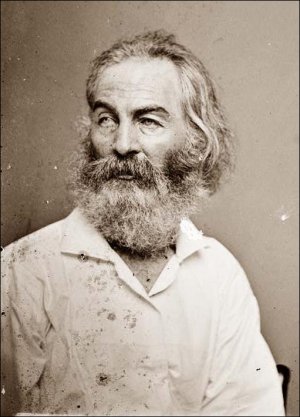
Walt Whitman (1819-1892)
More in: Whitman, Walt
Thank you for reading Fleurs du Mal - magazine for art & literature